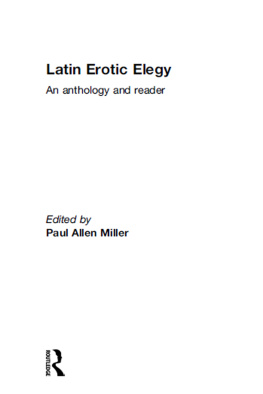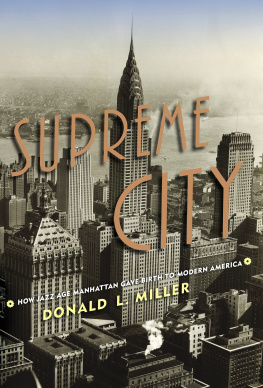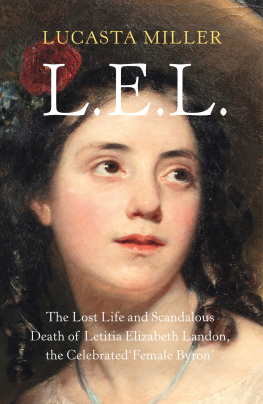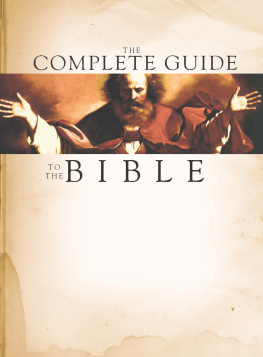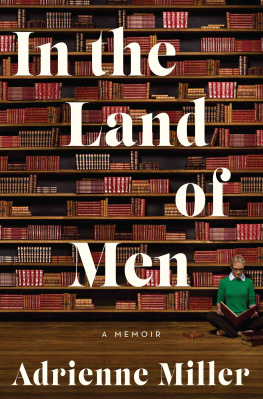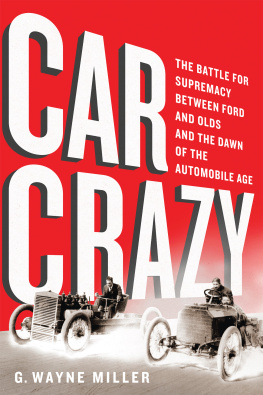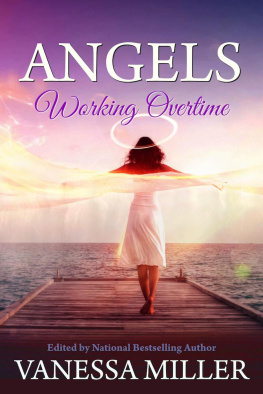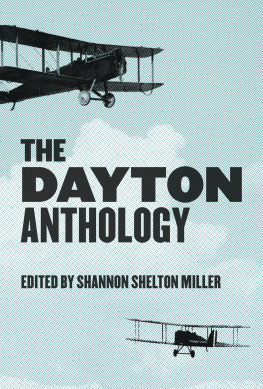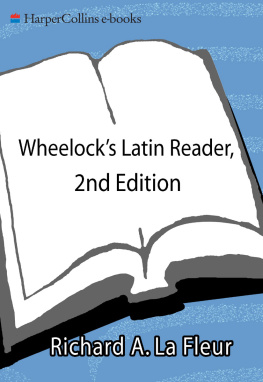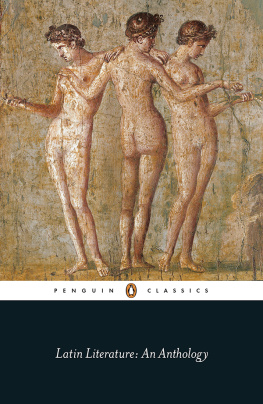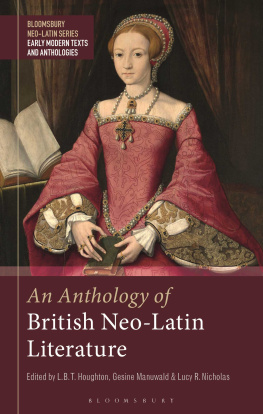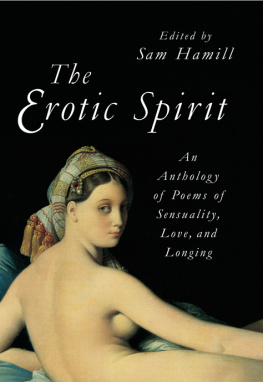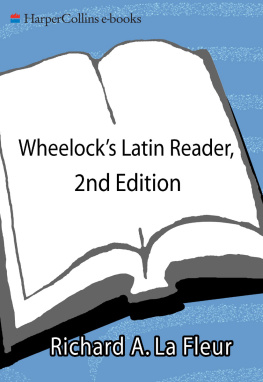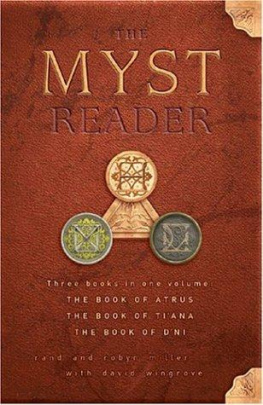Miller - Latin erotic elegy: an anthology and reader
Here you can read online Miller - Latin erotic elegy: an anthology and reader full text of the book (entire story) in english for free. Download pdf and epub, get meaning, cover and reviews about this ebook. City: London;Latein, year: 2002, publisher: Taylor & Francis (CAM);Routledge, genre: Romance novel. Description of the work, (preface) as well as reviews are available. Best literature library LitArk.com created for fans of good reading and offers a wide selection of genres:
Romance novel
Science fiction
Adventure
Detective
Science
History
Home and family
Prose
Art
Politics
Computer
Non-fiction
Religion
Business
Children
Humor
Choose a favorite category and find really read worthwhile books. Enjoy immersion in the world of imagination, feel the emotions of the characters or learn something new for yourself, make an fascinating discovery.
- Book:Latin erotic elegy: an anthology and reader
- Author:
- Publisher:Taylor & Francis (CAM);Routledge
- Genre:
- Year:2002
- City:London;Latein
- Rating:5 / 5
- Favourites:Add to favourites
- Your mark:
- 100
- 1
- 2
- 3
- 4
- 5
Latin erotic elegy: an anthology and reader: summary, description and annotation
We offer to read an annotation, description, summary or preface (depends on what the author of the book "Latin erotic elegy: an anthology and reader" wrote himself). If you haven't found the necessary information about the book — write in the comments, we will try to find it.
Latin erotic elegy: an anthology and reader — read online for free the complete book (whole text) full work
Below is the text of the book, divided by pages. System saving the place of the last page read, allows you to conveniently read the book "Latin erotic elegy: an anthology and reader" online for free, without having to search again every time where you left off. Put a bookmark, and you can go to the page where you finished reading at any time.
Font size:
Interval:
Bookmark:

The first comprehensive elegiac anthology for several decades, this volume is an invaluable resource for all those studying elegiac poetry, and will also be important for courses on Augustan culture and gender in the ancient world.
The detailed introduction looks at major figures, the evolution of the form, and the Roman context, with a particular focus on the changing relations between the sexes. The texts that follow range from the earliest manifestations of erotic elegy in Catullus, through Tibullus, Sulpicia (Romes only female elegist), Propertius and Ovid.
The accessible commentary explores the historical background, issues of language and style, and the relation of each piece to its authors larger body of work. The volume closes with an anthology of critical essays representing the main trends in scholarship; these illuminate the genres most salient features and help the student understand its modern reception.
Paul Allen Miller is Director of Comparative Literature and Associate Professor of Classics at the University of South Carolina. He is the author of Lyric Texts and Lyric Consciousness (Routledge 1994) and numerous articles on Latin, Greek, English and French poetry. He has also edited several volumes of essays including Rethinking Sexuality (1998), and the journal Intertexts.
An anthology and reader
Edited with an introduction and
commentary by Paul Allen Miller

London and New York
TO SAM, WITH ALL MY LOVE
First published 2002
by Routledge
2 Park Square, Milton Park, Abingdon, Oxon OX14 4RN
Simultaneously published in the USA and Canada
by Routledge
711 Third Avenue, New York, NY 10017
Routledge is an imprint of the Taylor & Francis Group
2002 Selection and editorial matter, Paul Allen Miller; individual extracts, the contributors
Typeset in Garamond by RefineCatch Limited, Bungay, Suffolk
All rights reserved. No part of this book may be reprinted or reproduced or utilised in any form or by any electronic, mechanical, or other means, now known or hereafter invented, including photocopying and recording, or in any information storage or retrieval system, without permission in writing from the publishers.
British Library Cataloguing in Publication Data
A catalogue record for this book is available from the British Library
Library of Congress Cataloging in Publication Data
Latin erotic elegy: an anthology and reader / Paul Allen Miller.
p. cm.
Includes bibliographical references and index
1. Elegiac poetry, Latin. 2. Elegiac poetry, Latin History and
criticism. 3. Erotic poetry, Latin History and criticism. 4. Love
poetry, Latin History and criticism. 5. Erotic poetry, Latin. 6.
Love poetry, Latin. I. Miller, Paul Allen, 1959 . II. Title.
PA6127.L38 2002
871.01083543dc21 2001048560
ISBN 0415243718 (hbk)
ISBN 0415243726 (pbk)
This text is designed primarily for students and teachers of advanced undergraduate and MA level classes, although scholars may find it useful as well. The Introduction provides a general overview of the genre of Latin erotic elegy in its historical and literary context. The commentary is designed to aid students in understanding both the language and the poetry. Discussion of textual matters and of sources has been limited to those cases where it is necessary for linguistic or artistic intelligibility. The critical anthology at the conclusion of the volume is designed to allow the student both a greater comprehension of the poems themselves and of the history of the debates surrounding them. The essays chosen, while they are all important, have been selected on the basis of their representing certain trends in scholarship on elegy rather than on any claim that they are intrinsically better than others that might have been chosen. Only essays that deal with the genre as a whole rather than single authors or poems have been used. Unfortunately, this means that many fine pieces of scholarship have been left out.
Citations have been kept to the bare minimum to aid in accessibility. Those wishing to do further reading should refer to the select bibliography at the end of the Introduction, which does not begin to reflect my debt to the previous scholarship in the field. The texts for the poems are all taken from the OCT editions, with the exception of Catullus where I have relied on Quinn and of the Heroides where I have used the Bud.
I owe debts of gratitude to many people and institutions. My thanks go first to my colleague Ward Briggs who suggested this project to me and then to Barbara K. Gold who introduced me to the elegists so many years ago. I should also thank Kevin Herbert whose love for Catullus first sparked my own. The manuscript could not have been prepared without the aid of my research assistant and student, Christel Brown, and of the secretary of the Comparative Literature Program at the University of South Carolina, Noreen Doughty. I owe a debt of gratitude to Micaela Janan of Duke University and Deborah Lyons of Johns Hopkins as well as to their students who used a draft of this text in their classes and provided invaluable feedback. Micaela, you were, as always, a helpful and supportive friend. I cant thank you enough for countless favors large and small. Ellen Greene read over the final versions of the manuscript, provided insightful criticism and invaluable moral support. All remaining faults are my own. Of course, I would be and do nothing were it not for the love and support of my wife, Ann Poling, and of Sam, the only person who still asks me to play tag.
Two University of South Carolina College of Liberal Arts Scholarship Support awards provided the time and funds necessary to travel to the Classics Library at the University of Texas at Austin to complete my research and to finish the manuscript.
George Luck, Introduction to Latin Love Elegy, copyright 1968; reproduced by permission of Routledge, Inc, part of the Taylor and Francis group. J. P. Sullivan, The Politics of Elegy, Arethusa 5:1 (1972), 1734, copyright Johns Hopkins University Press; reprinted with permission of the Johns Hopkins University Press. Judith P. Hallett, The Role of Women in Roman Elegy: Counter-Cultural Feminism. Arethusa 6:1 (1973), 10324, copyright Johns Hopkins University Press; reprinted with permission of the Johns Hopkins University Press. R. O. A. M. Lyne, The Life of Love from The Latin Love Poets from Catullus to Horace, copyright 1980 by Oxford University Press; reprinted by permission of Oxford University Press. Paul Veyne, Roman Erotic Elegy: Love, Poetry, and the West, translated by Davis Pellauer, copyright 1988 by University of Chicago Press; originally published in French as Elgie rotique romaine, copyright 1983 by Edition du Seuil; reprinted by permission of Georges Borchardt Inc. and the University of Chicago Press. Maria Wyke, Mistress and Metaphor in Augustan Elegy, Helios 16:1 1989; reprinted by permission of Texas Tech University Press. Duncan Kennedy, Representation and the Rhetoric of Reality from The Arts of Love: Five Studies in the Discourse of Roman Love Elegy, copyright 1993; reprinted with the permission of Cambridge University Press. Barbara K. Gold, But Ariadne Was Never There in the First Place: Finding the Female in Roman Poetry, from
Font size:
Interval:
Bookmark:
Similar books «Latin erotic elegy: an anthology and reader»
Look at similar books to Latin erotic elegy: an anthology and reader. We have selected literature similar in name and meaning in the hope of providing readers with more options to find new, interesting, not yet read works.
Discussion, reviews of the book Latin erotic elegy: an anthology and reader and just readers' own opinions. Leave your comments, write what you think about the work, its meaning or the main characters. Specify what exactly you liked and what you didn't like, and why you think so.

